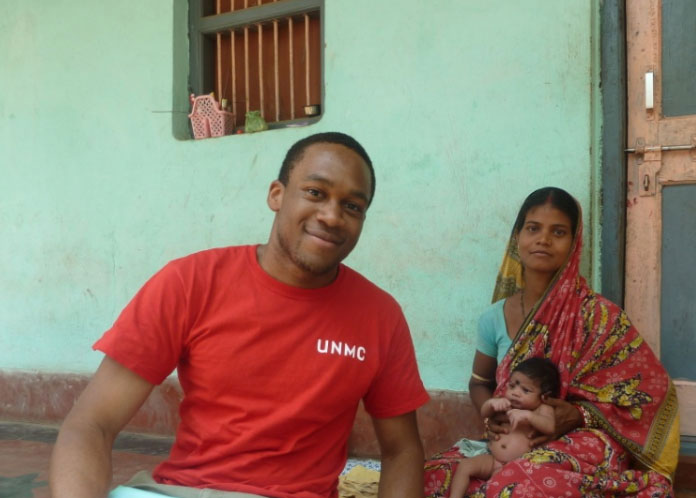
Through the COPH Center for Global Health and Development’s partnership with the Asia Institute of Public Health in Orissa, India, four students in the COPH Master of Public Health Program took part this spring in service-learning projects in Orissa, focusing on low birth weight, childhood nutrition, the new Indian health law, and reproductive health. Below, several of the students reflect on their experiences.
My main area of interest in public health is global maternal and child health, with an emphasis in nutrition. I was drawn to this area because doing something as basic as providing adequate food to vulnerable populations can drastically change their health outcomes. My research goal in Bhubaneswar was to describe the nutritional profile of both rural and urban children and to identify possible underlying factors that contribute to their malnutrition. Approximately 300 students aged 12-18 were surveyed from a private urban school and a public rural school. The rural children were much more likely to be underweight and stunted, while obesity was a bigger threat to the urban children. Conducting this project in India was an invaluable experience because I learned a lot about the challenges of completing research in a developing country, but also saw firsthand the monumental benefits that such research could bring to the local community.
TJ Ikhena
Growing up in Nigeria, I witnessed firsthand the disproportionate burdens of disease in certain communities, and wanting to address these health disparities became the backbone of my decision to pursue a career in public health. My area of interest in public health is general epidemiology, with a focus on infectious and chronic diseases. The purpose of my research in India was to determine known risk factors for low birth weight (LBW) babies in Bhubaneswar and to compare the prevalence of these risk factors between LBW and normal weight babies. I interviewed 103 mothers of newborn babies both in the government hospitals and also in their homes in the villages. My survey was aimed at obtaining the women’s sociodemographic profile and their maternal health, pregnancy, delivery, and antenatal history. Preliminary analysis of the data shows that malnutrition, high prevalence of anemia, and low use of iron folic tablets contributes greatly to the incidence of LBW babies in the community. My hands-on field work in conducting this research was an invaluable experience that I could never have had in a classroom or from reading a research article, and this reinforced my passion for research and trying to make a difference.
Social justice led me to study public health, and I am particularly interested in how public policy can affect health outcomes. While I would say we are in a situation locally and globally in public health that we cannot legislate our way out of, it’s imperative that access to vital health services be available across socioeconomic barriers. In the future I hope to continue studying health policy and eventually work to refine existing policy and legislate thoughtful solutions to improve access to care. The data I collected with the Asian Institute of Public Health reflects how a recent policy initiative in India, the National Rural Health Mission, is currently being used most often in rural settings. Generally speaking, we found that women of reproductive age were the most knowledgeable about health services available to them, and that overall, people can see that health is improving in their rural communities. My experience in India reaffirmed my interest in global health, sustainable and simple living, and the need for education to improve health outcomes. I look forward to working in developing nations in the future and continuing to research health policy outcomes.

